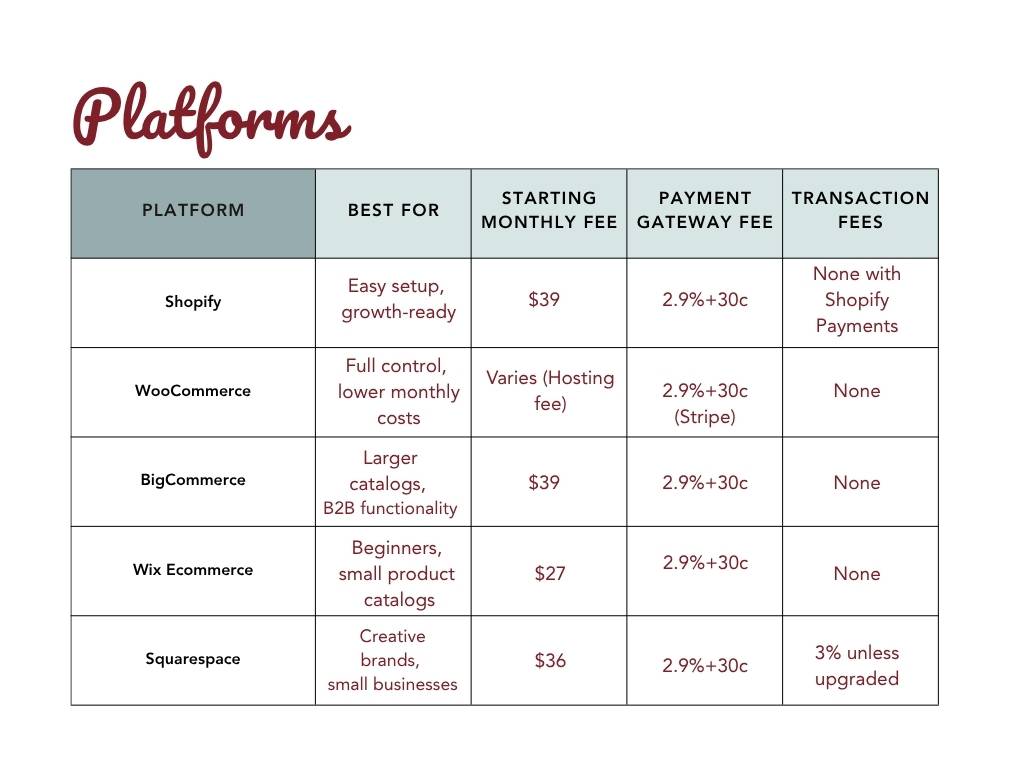Finding the best ecommerce platform for your business is more than a technical decision. It shapes how you connect with customers, process orders, and grow your brand. With so many ecommerce platforms available today, from niche marketplaces to fully customizable store builders, it’s important to choose one that fits your products and goals. That decision also affects how your orders are fulfilled behind the scenes. At Badger Fulfillment Group, we partner with sellers across all ecommerce platforms to provide fast, accurate, and scalable fulfillment that meets your customers’ expectations.
According to EMarketer,” US ecommerce sales are expected to reach $1.14 trillion in 2024, accounting for over 20 percent of total retail sales.” That kind of growth highlights the need for strong operations, clear channel strategy, and fulfillment you can count on. Whether you’re selling through Shopify, WooCommerce, Etsy, or Amazon, Badger supports the ecommerce industry by offering true omni channel fulfillment. Our team is in the warehouse and on your side, ready to handle everything from kitting and custom packaging to inventory management and 2-day shipping. We work with businesses at every stage, offering custom integrations and transparent pricing so you can focus on growth while we handle the logistics.
“US ecommerce sales are expected to reach $1.14 trillion in 2024, accounting for over 20 percent of total retail sales.”
Which Third-Party Platforms Are Right for You
If you’re just getting started, listing your products on a niche marketplace can be a smart way to test your brand, reach ready-to-buy audiences, and avoid the upfront costs of building your own store. These platforms handle traffic and payments so you can focus on product development and fulfillment. Badger Fulfillment Group works with sellers on a wide range of ecommerce platforms and helps manage inventory across multiple sales channels as you grow.
Here are a few popular third-party platforms and what types of businesses they serve best:
Etsy
Best for: Handmade goods, vintage items, craft supplies, personalized gifts
Etsy is a go-to platform for creative entrepreneurs. If you’re selling items like custom candles, jewelry, or home décor, Etsy makes it easy to reach a built-in audience looking for unique, personal products.
Ebay
Best for: Collectibles, refurbished goods, tech accessories, one-off items
eBay remains a powerful marketplace for niche categories and second-hand items. It works well for businesses with varied inventory or for sellers who want to move limited product runs without maintaining a full ecommerce store.
Walmart Marketplace
Best for: Brand-name products, household goods, electronics, beauty
With strong traffic and trusted name recognition, Walmart Marketplace is ideal for established sellers with strong fulfillment systems in place. You’ll need to meet Walmart’s performance metrics, which Badger can help support with on-time shipping and inventory accuracy.
Facebook and Instagram Shops
Best for: Direct-to-consumer lifestyle products, apparel, beauty, small-batch food
These shops integrate with social media and are great for visual products that benefit from customer engagement. Ideal for newer brands building awareness and community around their products.
Amazon Handmade
Best for: Artisan-style products with more control than Etsy offers
For makers looking to reach Amazon’s large customer base without losing the handcrafted feel, Amazon Handmade is a specialized corner of the marketplace. It’s important to maintain fulfillment standards that align with Amazon’s guidelines, which Badger can support.
Tips for Selling on a Marketplace Before Launching Your Own Site
When It’s Time to Sell on Your Own Ecommerce Platform
Selling through a marketplace is a great first step, but as your business grows, so does the need for more control over branding, margins, and customer experience. That’s when building your own ecommerce store becomes the next move. If you’re wondering about marketplace fees vs your own website costs for selling online, the shift can often save money long-term while giving you full ownership of your store’s design, product presentation, and customer data.
The best ecommerce platforms for new businesses are ones that balance ease of use with room to scale. Badger Fulfillment Group integrates seamlessly with these platforms, supporting your shift from single channel selling to a fully independent store. Here’s what to consider:
Shopify
Best for: Fast setup, ease of use, app integrations
Shopify is ideal for sellers looking for a user-friendly builder with all the essential tools in one place. It’s popular among apparel, health, and food brands due to its flexibility and third-party app ecosystem.
WooCommerce
Best for: Sellers already using WordPress, high customization
WooCommerce is a great fit for brands that want complete control over their website. You’ll need some technical knowledge or development help, but the platform is highly scalable and cost-effective for content-driven brands.
BigCommerce
Best for: Growing businesses with complex needs or B2B plans
BigCommerce offers strong built-in features like multi-currency support, advanced analytics, and B2B functionality. It’s well-suited for brands ready to scale fast or manage large catalogs with fewer plugins.
How Much Does an Ecommerce Website Cost
Owning your own ecommerce site comes with predictable fees, many of which vary based on your platform choice. Here are the three core types of costs:
Monthly platform fees:
This covers your access to the ecommerce builder and tools
Payment gateway fees:
A small percentage paid for processing credit cards
Transaction fees:
Additional fees some platforms charge on each sale, on top of gateway fees
To help you decide, here’s a quick look at the best ecommerce platforms at a glance:

If you’re thinking about the best platform for selling your products online, Badger can help ensure your fulfillment systems are ready when you make the switch.
Planning for B2B and Wholesale Growth
As your ecommerce business scales, you may reach a point where selling directly to customers isn’t your only revenue stream. Expanding into B2B or wholesale requires platforms that can support volume pricing, purchase orders, custom catalogs, and tiered customer accounts. The good news is many top ecommerce platforms can grow with you
Shopify offers B2B features through its Shopify Plus plan, giving you tools like net payment terms, custom storefronts, and integrations with wholesale marketplaces. WooCommerce offers B2B plugins that let you hide prices until login, create separate pricing for wholesale buyers, and handle larger order workflows. BigCommerce stands out for having built-in B2B features, making it one of the strongest ecommerce platform options for hybrid B2C and B2B operations.
No matter which platform you use, Badger Fulfillment Group is ready to support your business as it shifts into wholesale. Our system handles bulk orders, separate inventory channels, and custom packing needs to keep your operations running smoothly.
Should You Sell on Amazon
Amazon can be a powerful sales channel for ecommerce brands, especially those with fast-moving consumer products. Its built-in traffic and trusted checkout experience make it easy to reach millions of customers without spending heavily on marketing. If you’re selling products like electronics, health supplements, pet supplies, or household items, Amazon can drive strong early momentum.
But there are tradeoffs. Amazon controls the customer relationship, limits branding, and charges various selling fees that can cut into your margins. It can also be competitive and fee-heavy, especially for new sellers. Some businesses start on Amazon and later build their own store for more control. Others run both channels and use Badger Fulfillment Group to manage inventory across them.
We help ecommerce sellers handle Fulfilled by Merchant (FBM) with reliable delivery metrics. Our Amazon integration keeps your store in good standing while giving you flexibility behind the scenes.
Simplifying Omni Channel Order Management
As your business grows across multiple sales channels, keeping orders organized becomes more complex. Selling through your website, Amazon, Etsy, and retail partners requires a fulfillment partner who can manage everything from one place. That’s where omni channel order management becomes essential.
Badger Fulfillment Group specializes in omni channel fulfillment that syncs your inventory, tracks orders across platforms, and gives you real-time visibility, all without slowing you down. Whether you’re using Shopify for your direct-to-consumer store, Etsy for handmade products, or selling wholesale to retailers, we make sure your orders ship out on time and accurately. Our team works in the warehouse with your products every day, so we’re able to make changes fast and communicate clearly when you need support.
With seamless platform integrations and hands-on customer service, Badger helps you deliver a consistent experience no matter where your customers shop.
What to Consider When Choosing a Platform:
• Your budget: Platform fees and add-ons can vary
• Required features: Think about things like discount codes, shipping rules, and product bundling
• Ease of use: Some platforms offer drag-and-drop simplicity while others require coding knowledge
• Support and analytics: Make sure the platform offers the insights and help you’ll need as you grow
And remember, you’re not locked in forever. Many sellers evolve from niche platforms to independent stores once they’ve built a customer base. Badger Fulfillment Group grows with you at every stage, helping you stay flexible as your ecommerce business changes.
No matter where you sell or which platform you choose, Badger Fulfillment Group is here to make fulfillment easy, fast, and scalable. Let us handle the logistics so you can focus on building your brand.


